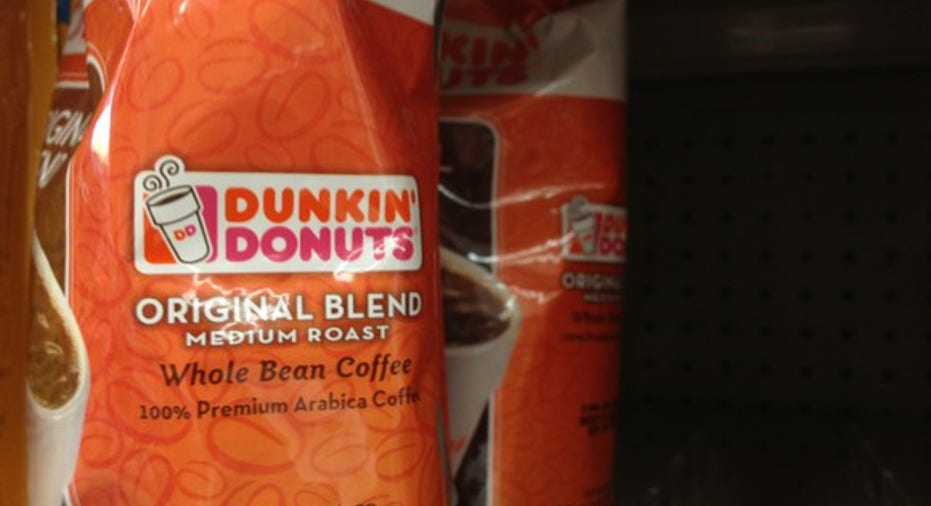Even With Bottled Drinks, Dunkin' Donuts Can't Catch Starbucks

Image source: The Motley Fool.
Coca-Cola(NYSE: KO) andDunkin' Brands'(NASDAQ: DNKN) Dunkin' Donuts may not seem like natural partners, but common enemies have a way of bringing two companies together.
Starbucks(NASDAQ: SBUX) not only dominates the coffee shop business, but it has built a formidable stake in ready-to-drink beverages with its glass-bottled Frappucinos and Doubleshot cans that are widely available in convenience stores and supermarkets. The coffee giant produces and distributes those drinks through a joint venture withPepsiCo, Coke's archrival.
With coffee consumption on the rise and soda sales falling, it shouldn't be surprising to see Coca-Cola angling for a foothold in another caffeinated beverage. After all, the soda giant has already invested inMonster Beverage and held a stake in Keurig Green Mountain before it was taken private. Seeking a new coffee partner, Dunkin' Donuts looks like a perfect match.
Dunkin' announced on National Coffee Day last week that it would launch a line of ready-to-drink coffee beverages in the U.S. early next with the help of Coca-Cola, who will manufacture, distribute, and sell the drink.Coca-Cola, meanwhile, has experience selling coffee beverages elsewhere. Its Georgia brand is a top seller in Japan,and it also plans to sell cold-brew coffee in U.S. stores under its brand Gold Peak next year. According to the partnership, Coke will pay a percentage of sales to Dunkin', which it will split with its franchisees, though financial terms of the deal were not disclosed.
A tasty opportunity
The U.S. ready-to-drink coffee market is growing fast as sales increased 14% to $2.54 billion last year, according to Euromonitor International, the fourth straight year of double-digit sales growth. Currently, Starbucks dominates the market with a 75% share, while Monster is the No. 2 brand.
Both Starbucks and Dunkin' Donuts have found growth opportunities in consumer packaged goods. Starbucks' channel development segment, which includes packaged goods like ground coffee, ready-to-drink beverage and U.S. foodservice accounts, is the company's most profitable segment, based on margin, as it delivered an operating margin of 37.8%, and revenue from consumer packaged goods hit $1.33 billion last year. Such strong profitability shows the power of the Starbucks brand.
Dunkin' Donuts has been slower to build out its own consumer packaged goods, but it has begun selling bagged coffee and K-cups in grocery stores nationwide. Dunkin' lumps consumer packaged goods with items including online training fees and licensing fees in its other revenue category, which contributed $43.6 million in revenue last year, or 5.4% of total revenue.
While Starbucks dwarfed that figure, Dunkin' Donuts has found some success in consumer packaged goods -- other revenue nearly doubled last year when it introduced K-cups. Dunkin' also says its 10-count carton of original blend is the No. 1 SKU in the K-cup pod category. It sold more than 150 million pods last year, and the company predicts that it will sell 2.4 billion cups of coffee through the grocery channel this year along with 2 billion cups in its stores.
A slow-footed response
Perhaps a better question to ask than why Dunkin' Donuts and Coke are launching a bottled coffee brand is: What took so long? Starbucks has been selling the popular bottled Frappuccino for more than 20 years, and Dunkin's late entry is another sign of the brand's inability to innovate as it's followed its larger rival in essentially every major shift in the coffee industry over the last generation.
Dunkin' is a different brand than Starbucks, focusing on more of blue-collar coffee-and-donuts crowd, but it has been slow to make natural brand extensions, such as selling bagged coffee, K-cups and now ready-to-drink beverages, and has been slow to modernize the brand as tastes change. For instance, Dunkin' didn't add espresso drinks to its menu until 2004,three years afterMcDonald'sfirst brought McCafe to the U.S.
Dunkin' also followed Starbucks into flavored beverages like the popular Pumpkin Spice Latte, and jumped on the cold-brew bandwagon more than a year after Starbucks. Dunkin's lunch menu, meanwhile, continues to be a work in progress.
The New England-based coffee chain has loyal legion of fans, which have provided a market for its K-cups and bagged coffee, and should do the same for bottled drinks. But the company has consistently shown an inability to innovate and adapt, which is part of the reason why its store base is still highly concentrated in the Northeast, while Starbucks has taken over the country and now the world.
Selling bottled drinks will add another revenue stream, but it won't solve the brand's core problem.
A secret billion-dollar stock opportunity The world's biggest tech company forgot to show you something, but a few Wall Street analysts and the Fool didn't miss a beat: There's a small company that's powering their brand-new gadgets and the coming revolution in technology. And we think its stock price has nearly unlimited room to run for early in-the-know investors! To be one of them, just click here.
Jeremy Bowman has no position in any stocks mentioned. The Motley Fool owns shares of and recommends Monster Beverage, PepsiCo, and Starbucks. The Motley Fool recommends Coca-Cola. Try any of our Foolish newsletter services free for 30 days. We Fools may not all hold the same opinions, but we all believe that considering a diverse range of insights makes us better investors. The Motley Fool has a disclosure policy.



















